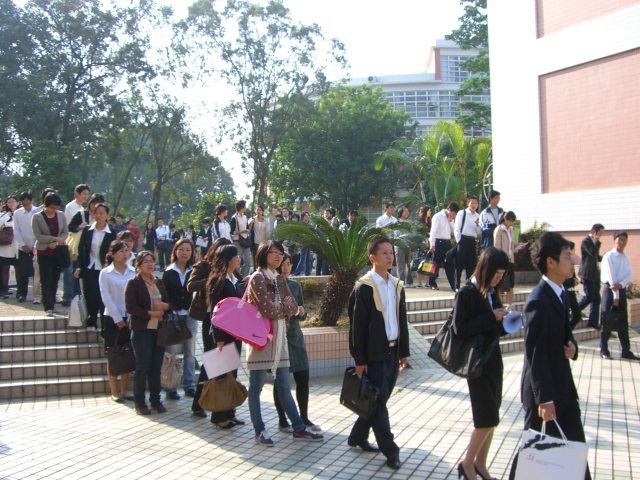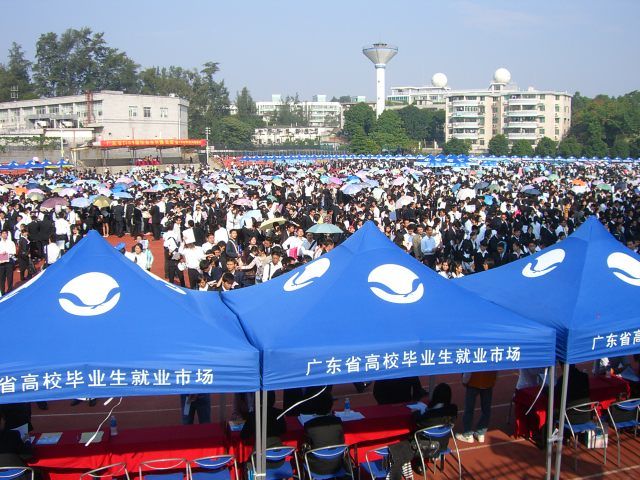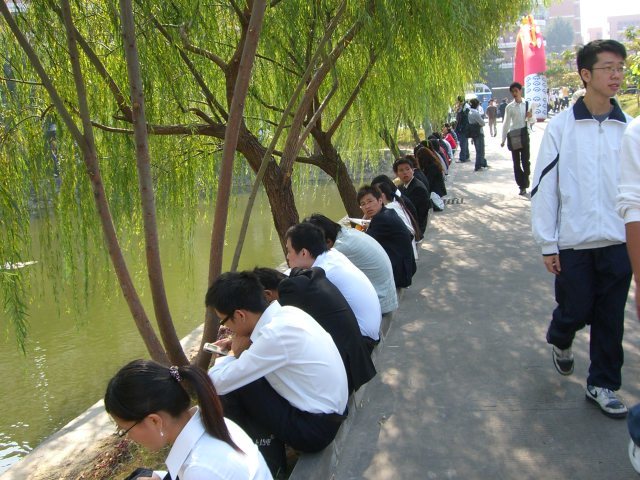
This is a backgrounder to a story I did for the San Francisco Chronicle on university graduates in China worried about their job prospects. I was down in Guangzhou during the final week of November and attended a job fair to interview students about how they felt about the state of the economy and whether or not they were worried about finding a job. On the day I was there, 19,000 students showed up and the numbers were similar during the rest of the week. Most said they were very concerned about how hard it might be to find a job, but all said they were hopeful - if not about the short term - about their long-term futures. The pictures here are from the job fair at South China Agricultural University in Guangzhou on November 24.
I recently sent questions to several experts on the Chinese economy while I was doing research on the story, and since we decided to mainly focus on the reactions of the students, we weren't able to get much of this other information into the piece. Three answered - Albert Keidel, former economist at the World Bank in Beijing and now at the Carnegie Endowment for International Peace; Scott Rozelle, an expert on China at Stanford University; and Wang Xiaohui, an expert on human resources in China at Sun Yat-Sen University in Guangzhou. What they said was informative and actually very optimistic, so thought I'd post it here as a backgrounder for any interested China watchers out there. I've edited these slightly for style or errors. Wang's answers, which came in after my story was submitted, were translated by my assistant. I've polished these to my best understanding.
Q. The World Bank projects a 9.4 percent growth rate for China in 2008 and a 7.5 percent growth rate for 2009. Others, like international consulting firm AT Kearney think it might go as low as 6 percent. Since many analysts believe the Chinese economy must keep a growth rate of 8 percent and above to absorb the millions of new graduates and workers every year, how serious do you believe the situation for China is and how serious do you think the unrest we've already seen could get? Do you think authorities are doing enough to address the situation? Was the $586 billion stimulus plan (and smaller, provincial plans that have followed) enough?
Keidel: My parsing of the quarterly data and data from October indicates that in the second and third quarter China's domestic demand (consumption plus investment) actually strengthened, growing in the low teens. But the export surplus stopped growing and actually declined slightly, lopping off roughly 2.5 percentage points from the 12 percent growth pace in 2007. Hence, the 9.9 percent growth through the third quarter. Modeling next year on a quarterly basis, even if the trade surplus shrinks dramatically - a negative component in GDP demand - this domestic demand strength, especially if supplemented by the stimulus program, should keep GDP growth for 2009 close to 9 percent. This is after a first quarter growth rate of 6 to 7 percent. So, I don't now see a threat to employment growth over the whole year next year. I think the unrest is natural for structural changes like this - basically a partial shake-out in low-end coastal manufacturing. The stimulus plan may be too much, but they have time to adjust it as 2009 unfolds.
Rozelle: Only 6 percent growth ... most countries will be negative. But, as you point out, it is about expectations. Obviously there will be unemployment. I think the Chinese government will gear up to provide more unemployment insurance and people will look until they find a job, or lower expectations. What else can they do? I think they [the Chinese government] are responding well. I think they need to present a vision of what is going to happen. There is going to be two years of belt tightening for many and then hopefully renewed growth.
Wang: The situation at the moment is serious, so the government is working on the stimulus package and is trying to create job opportunities. According to the projections of the government this year, economic growth can reach 8 percent, and it should reach 9 percent next year. This situation won't get worse, and it will turn better probably from next summer on because of the government investment. They've done a lot so far. First it invested money to promote economic development, and it has issued some measures to encourage further investment. Actually, the stimulus package investment is not only $586 billion - there are also provincial and local government stimulus plans - so it should be $1465 billion in total. That can guarantee that economic growth reaches 9 percent next year. There are still large markets in China, and these investments can narrow the gaps between urban and rural areas, and economic growth will rise once these markets are exploited.
Q. In 2008, some 5.5 million students graduated from universities in China, and according to a Xinhua report 800,000 of those haven't found work. In June next year, 6 million more students will graduate. Given these figures, what is your view of the situation facing university graduates and how concerned do you think the Chinese government is of the more educated not finding work, as opposed to low-wage, low-education blue-collar and migrant workers not finding jobs? Who are they more afraid of? Keidel: Employment for university graduates is tricky, because of the traditional elite status of college grads and the expectations that they will continue to enjoy that elite status as the size of graduation cohorts increases and adds to the already existing pool of graduates. It is no easy job to adjust such expectations downward. Since I don't expect a major downturn to still be operating in China by summer of next year, they should continue to have at least the same degree of success they have had this year. I don't think it is reason for a crisis. The same is true for migrant workers, who in many cases have more flexible lifestyles and weaker bargaining positions. If urban formal sector employees were affected by the crisis, that would be a more serious cause for concern, but that doesn't seem to be the case. Given my expectations about the domestic economy's strength next year, I don't think it will become a concern, either.
Rozelle: It is a myth that college grads haven't been able to find jobs (at least up until now). There is a report by Cai Fang, CASS, that shows that 98 percent of college grads had jobs one year after graduation. Their wage growth was far above average. Most join the middle class by the time they are 27 to 30. The return to a college education is still very high. Don't let any one ttell you any different. Sometimes expectations are not met. I did not get 5000 yuan a month right out of college. But, if they work hard, they soon will. [The government] is concerned, but it is not the biggest concern.
Wang: That's about 15 percent of this year's graduates who haven't found work. That's probably a little lower than the actual number, but the real number is near this number. It's a fact that many students can find jobs. But they also can't find satisfying jobs and they refuse jobs with bad work environments and low salary and are unwilling to work in rural areas. If more students would work in small cities, the number would not as high as 800,000. In the coming year, there will still be around 10 percent of graduates who can't find jobs even when the economy is better, because most of them want to stay in big cities.The government has implemented measures to encourage graduates to work in underdeveloped areas, though this mainly focus on government employees. As for the enterprises, it's hard for government to give subsidies to graduates, but I think the government should try to promote the importance of graduates working in underdeveloped areas. Besides, the stimulus plan will go to major infrastructure projects which will have chain effect in economic, especially in big cities. Then lots of graduates can be absorbed and because of this many graduates can stay in the cities. Compared graduates looking for jobs and migrant workers, the government is more concerned about migrant workers not finding jobs. There are many dangers if we don't deal with migrant workers problems properly. Migrant workers have many more pressures in life because most of them have to support families. It's not realistic for them to go back to their hometowns. Many of them left their hometowns years ago and they don't know how to farm.
Q. Most of the university students I talked to were very worried about finding a job, but I found most of them to be optimistic about their long-term prospects. What do you think could be done better to create more work for university grads in China, and do you think the government is doing enough in this regard?
Keidel: The bulk of job opportunities for college grads will be in enterprises as low and eventually middle level managers. This lower status requires an adjustment of expectations about the kind of jobs such graduates can expect to enjoy, but that adjustment will come. The best thing the government can do is stimulate growth. Corporate entry-level white-collar jobs will follow.
Rozelle: China is going to need more college grads in the future as their economy grows.Nothing needs to be done more than good economic management. Maybe a bit more aid for graduate schools during the recession.
Wang: First, economic development across China is not in equilibrium. About 80 percent to 90 percent of localities are underdeveloped, while there are only several developed cities, so the government should encourage college graduates to work in smaller cities. At the same time, the government needs to do more to stimulate the economy in smaller cities so that graduates have more job opportunities. Actually, government has such an economic plan, but it's not detailed enough yet and it has not be implemented.
For more on China every day, check in at China Notebook.





